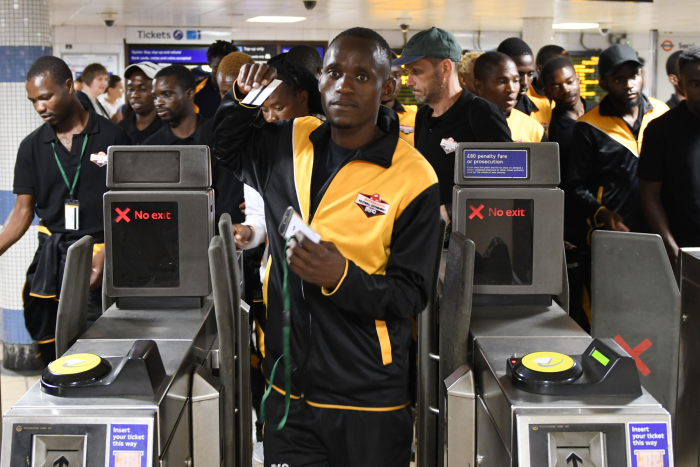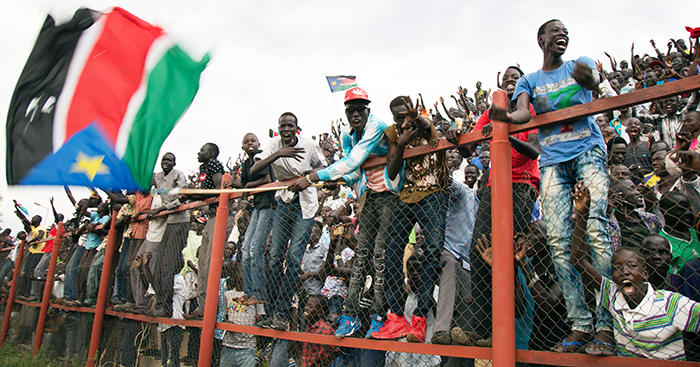Hospitals, secret police & the English explorer who managed an African state


Even by Justin Walley’s standards, it took a strange turn of events for the Indiana Jones of football to decide he wanted to become an international manager.
Born and raised in Leicestershire, Walley grew up supporting Northampton Town but has been travelling the world since his early 20s after he and a friend were at a wedding and realised, “If we don’t get out of here, it’s going to be us next.”
Twelve months later, they were embarking on a journey which saw them visit 35 countries in 15 months. Walley has had itchy feet ever since.
“For me now it’s 25 years on the road,” he says. “I’m fortunate enough to have been to more than 100 countries. You fall in love in places and have remarkable experiences.”
Those experiences include having to escape Indonesia after the collapse of the Suharto government in 1998 because “a few people were getting killed”, and getting evacuated from Bolivia with the help of international embassies amid threats from miners that the airfield could be attacked.
That’s not to mention being held at gunpoint in Kyrgyzstan, getting stung by a scorpion in Tanzania and facing accusations of being a Kremlin spy.
“It’s an addiction. If I had to give it up I don’t know where I’d be.”
But Walley did settle down for a couple of years at one stage, moving to Latvia and co-founding Riga United FC.
Over time he helped build the club up from the ground, and by the time he left they were two senior men’s teams, two ladies’ sides and a thriving academy of six age groups. Six players from the club have even gone on to represent the Latvian national side.

Walley’s role within the club was all-encompassing. He was club secretary, marketing manager, social media manager, ladies head coach and youth academy coach as well as working on the club’s board.
Eventually this all caught up with him. He was burned out, frazzled and in hospital.
“I had a stomach problem that just came out of the blue,” he says. “With stress I’d had stomach pains for a couple of years on and off.
“I went through a particularly stressful period with the club where some lads were trying to take the club over and I felt they were up to no good. Myself and a couple of people were fighting to keep the club from being lost.
“These pains went away, but I got to the end of a season and the ladies team lost a semi-final. We’d had a record crowd and I was really confident we were going to make the final. I went out that night and had a bit of a blow out with food and a few drinks and got these terrible pains again.
“I had to rush to hospital and had to have one big operation that didn’t go well and then a second. It was something I was born with, but I think it had been set off by stress. I was in hospital for a couple of weeks and bed bound at home.”
It was at this point Walley decided to walk away from football, which had consumed his life until that point. Instead, it set him on his way to managing in a World Cup.

He and his partner went travelling once more, and it was during this period he decided he wanted to work in elephant conservation.
That option soon went out of the window when he discovered he would have to pay around £5,000 just to work as a volunteer. So instead he did what he knows best. He ventured into the unknown once again, booked a cheap flight to the Balkans and spent time in a Macedonian monastery.
It was there, 2000 metres above sea level, unable to communicate with anyone as the only foreigner, he made his decision. Not only did he want to return to football, he wanted to manage an international outfit.
A role as head coach of a Pacific Island nation almost materialised only to fall through at the last minute. Again he considered walking away from football, but then an even more intriguing proposal came his way; the chance to manage Matabeleland, a region of Zimbabwe, in the CONIFA World Cup.
Matabeleland, home of the Ndebele people, has a troubled past. In 1983, over 20,000 civilians were killed by Robert Mugabe’s Fifth Brigade in what became known as the Gukurahundi Massacres. Almost a century prior to that, there were wars amid British colonisation.
Indeed, Walley witnessed a period of turmoil himself as a military coup forced the collapse of the Mugabe government.
• • • •
READ: The story of South Sudan, war, football & a refugee that nearly joined Man Utd
• • • •
“With the lack of freedom of movement due to the political situation at the time I was conscious I had to keep my head down,” Walley says. “We knew we were monitored and that people knew about the project.
“There’s secret police everywhere in Zimbabwe. I think we were followed on a number of occasions. You’re aware the authorities might just call you in one night and you could get detained and thrown out of the country.
“When the military takeover happened in Zimbabwe nobody knew what was going to happen. We didn’t know whether it was going to descend into civil war. It was troubling but there was no violence. Sometimes the scariest thing is your imagination.”
Walley has chronicled his time as Matabeleland manager in a new book ‘One Football No Nets’, with the title referring to the resources – or lack thereof – at his disposal.
It charts the journey from Zimbabwe to London, where Matabeleland competed in the CONIFA World Cup, which allows states unrecognised by FIFA to be represented on the global stage.

For many of the players it was a once-in-a-lifetime opportunity. They suddenly found themselves being interviewed by the world’s media, getting asked by people for photos and having a kickabout in front of Buckingham Palace.
They even had the chance to work with former Liverpool and Zimbabwe goalkeeper Bruce Grobbelaar, who joined Walley’s coaching staff for the tournament.
“He’s a lot of fun,” Walley says. “He’s got a lot of charisma. But he can also be very serious. I appreciated that he didn’t come in and take it over as a much more experienced football person.
“He didn’t undermine the rest of us and what we were doing, which is a skill in itself I think. He really mucked in.
“The first game he was down at Sutton two hours before and setting up the changing room. He made sure he got there before Padania to steal their changing room and get in their heads. It was an honour to have him.”

Walley is no longer in charge of Matabeleland but stays in contact with many of the players and still works closely to their organisation in his role as CONIFA Africa President.
Every now and again he’ll check his phone to see a message on social media, “How are you, coach?”
“It’s lovely. They’ll always have a place in my heart.”
Having seen so much of the world, Walley’s travels have given him the chance to step back and reconsider his perspective on English, and his outlook goes a long way to explaining why he has enjoyed so many adventures.
“Sometimes it takes itself a bit too seriously. It’s the home of football and the support is incredible. But it’s too corporate in its nature. Even on the coaching side it’s all about getting your badges and you’ve got to do A, B, C, D.
“It shouldn’t necessarily be like that, you’ve got to keep a natural element to it. I find it a strange one. I’d be critical of a lot of things. There’s just an atmosphere that is too serious.
“Football is about fun, isn’t it?”
To buy One Football, No Nets (it’s really rather good and is also printed really nicely) click here.
By Rob Conlon
More from Planet Football
The story of South Sudan, war, football & a refugee that nearly joined Man Utd
‘The situation is too dangerous’ – Shakhtar’s four years in exile





